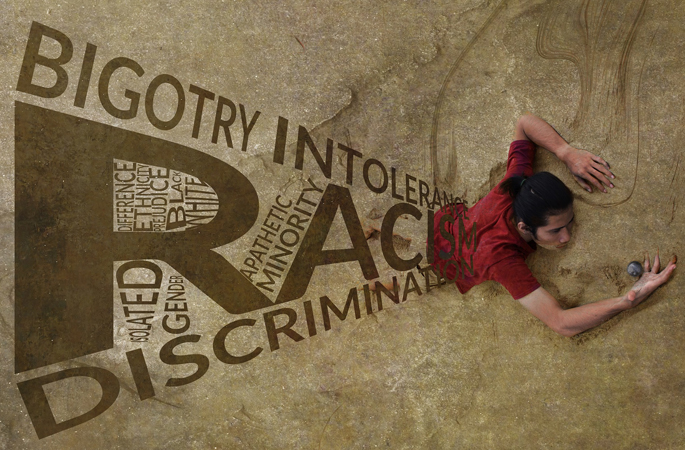A couple of weeks ago, hundreds of white supremacists gathered in Charlottesville and chanted “White Lives Matter”. Which sparked a clash between anti-fascist groups and white supremacist groups. Resulting in three dead and dozens injured.
Why do we see a growing culture of hatred in our society? Where were societies previously bounded by mutual trust and solidarity? Instead, we are seeing an increasingly large amount of hatred based groups, and a growing hate culture.
This whole hate culture is typified by a recent dating app called Hater where you can date someone you mutually hate. It’s becoming increasingly popular to see the groups which are formed not by a common motive to make a better society but to hate another set of human beings.
We are entering an era where we are losing institutions which are for the promotion of solidarity based on mutual trust. They are being replaced by hate groups. This is deeply rooted in the society where TV series and movies are popular, which promote and elevate cynicism and hate, and mock love and compassion.
There are even certain sets of vocabulary used such as snowflake used to demean and belittle others.The roots of hatred come from irrationality, which derives from an inability to understand the roots of an issue.
Let’s take the white supremacist movement narrative. If you roughly narrow it down, the doctrine it promotes is that white people are becoming marginalized in the society, therefore, white people need to fight back as a race and claim the superiority.
If you read between the lines it’s not very difficult to understand their angle. Which makes it even clearer if you look it up objectively as to why in 2017 we hear racism, in the age of information. In order to achieve objectivity, we need to go into statistics.
The majority of the people who are involved in these movements come from the lower middle class. One of these racist vloggers, who named himself millennial woes, A 34-year-old British male. He admits that he lives with his father on social welfare. His youtube channel is popular among the far-right groups.
The same applies to Milo Yiannopoulos, a lost entrepreneur who failed his hustling projects and later a found a market in the alt-right and made a business model out of it. Usually, these groups involved in ultra-right activities are often portrayed in their most subjectively apparent commonalities. Such as white, Nazi, fascist anti-gay etc.
However, all these hate-based populist groups have something more convincingly in common. Which is their socio-economic class?
Which is the lower middle class?
Which was the most economically suppressed class in society?
Michigan in The United States provides a much more lucid picture of the history of this particular class.Where once they had the largest industries in The United States, and accommodated a massive industrial workforce, the decay of Detroit is a Wikipedia fact.How does a person who is living in this type of a decline social conditioning explain to himself or herself what is happening around them?
But the mainstream ideologies were built in a such a way that they would no longer rationalize this new situation from a socio-economic perspective. It should be obvious that this is a result of a social conditioning.
This particular class is the most economically marginalized class in the western society. Most of the social benefits that they were entitled to be cut down by economic austerity. They were driven and displaced by their neighbourhoods to feed the property bubble of real estate development. They never felt entitled and could not afford a proper education.
This Serious economic suppression is the context in which these people try to find answers to the harsh situation they are in. However that economic context will never provide a proper explanation to the psychological condition which they are in. So they will be victims of highly subjective observations like “Muslims invade the West“, “Immigrants take our jobs”, and so on.
Today an understanding of the world via economic rationality is being taken away from the common masses.
Often people’s economic understanding was derived via non-economical considerations. When real problems like declining of social care, and the decline of social conditions which was a result of current neoliberal policies are answered by synthetic policies like budget deficit, and we are told that although the economy is growing, there are “no money trees”– analogy by Theresa May, and the “piggy bank is empty” -analogy by Barack Obama.
People will not be comforted by statements such as this. Then they will be vulnerable to believe those ‘fast food’ subjective arguments rather than synthetic answers made by the neoliberal fantasies. Because they seem more authentic. As they believe what is authenticated by emotionality over rationality.
Once, Slovenian philosopher, Slavoj Zizek wrote: “No ethnic cleansing without poetry”. What can we do?.
If you want to defeat anything, you target it where it’s weakest. Fighting on the ground will never prevent it, and that will even justify what these far-right groups are doing. Encountering them on the street is not the best battleground. The real battleground is education.
Find the root causes of these far-right ideologies. You encounter ignorance with knowledge, not with irrational aggregation. Irrational aggregation will only lead to another chain of aggression. ♥”Na hi verena verani sammantidha kudacanam averena ca sammanti esa dhammo sanantano”. Hatred is, indeed, never appeased by hatred in this world. It is appeased only by loving kindness. This is a universal law.
♥ Dhammapada Verse 5 Kalayakkhini Vatthu.



